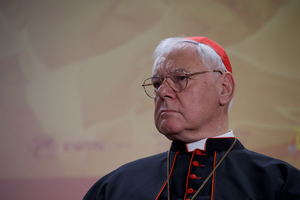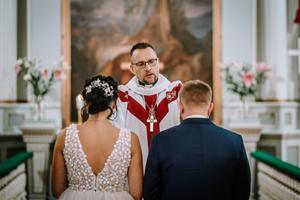Sex-Abuse Commission Member’s Suspension Overshadows Vatican Meeting
Other members of the commission reportedly voted unanimously in favor of a leave of absence for Peter Saunders, who has generated controversy since his appointment in 2014.

VATICAN CITY — Members of a pontifical commission are asking Pope Francis to remind all Church authorities of the importance of responding directly to abuse victims who approach them.
The recommendation was just one of a series of proposals drawn up at the end of a weeklong plenary meeting of the Pontifical Commission for the Protection of Minors, a body Pope Francis set up in 2014 to propose initiatives to protect children from clerical abuse.
But media coverage of the meeting has focused on another, unexpected development: The commission’s announcement of the suspension of controversial commission member Peter Saunders.
Other plans put forward during the plenary included more transparency around canonical trials with the participation of external collaborators, the finalization of a Universal Day of Prayer and a penitential liturgy, and a new website to share best practices for the protection of minors worldwide.
In a Feb. 8 statement, the commission also reported on its work over the past year, saying its members are “actively in contact” with bishops’ conferences and had presented measures on safeguarding minors to religious conferences and congregations.
Commission members have also met with bishops and child-protection authorities in eight countries. Further meetings are planned in Ghana and Tanzania with African bishops, as well as a conference for Anglophone members in Rome, and probably another for Asian bishops in 2017.
The commission also reported that, next week, 19 participants from four continents will be starting the first diploma course in safeguarding minors at the Pontifical Gregorian University. Beginning in September, the commission will also focus on safeguarding minors in Catholic schools and is inviting contributions from specialists in Latin American, England and Wales.
But last week’s plenary meeting was overshadowed by the announcement that Saunders, who is a victim of clerical abuse, would be taking a leave of absence. Saunders contested the decision.
In a Feb. 6 statement, the commission said that after discussing “the direction and purpose” of the body, “it was decided that Mr. Peter Saunders would take a leave of absence from his membership to consider how he might best support the commission’s work.”
Saunders, appointed to the commission in December 2014, became increasingly critical of the commission’s process of reforming the Church’s abuse protocol. He is founder of the U.K.’s National Association for People Abused in Childhood (NAPAC), which focuses on abuse prevention and support for abuse survivors.
In comments to reporters Feb. 6, Saunders said he was “never told in advance of any such statement” and that he found it “outrageous” that he was “not told, much less that the statement occurred before I had had any time to reflect on what I might do.”
He added: “I have not left and I will not leave my position on the commission. I was appointed by His Holiness Pope Francis, and I will only talk to him about my position.”
Unanimous Decision
Vatican sources have told the Register that the reason for Saunders’ suspension was “very clear” in their discussions and that he was aware that commission members had voted unanimously, with one abstention, to suspend him.
The 17-member commission was created by Pope Francis in March 2014, with Cardinal Sean O’Malley of Boston and U.S. Msgr. Robert Oliver appointed, respectively, as its president and secretary.
One Vatican source speaking anonymously stressed that the task of the commission is to promote child-protection work in local Churches, through guidelines and best practices. And while it recognizes Saunders’ passionate advocacy work, his strong belief about the focus of the commission — that the only effective action for the commission is to intervene in individual cases around the world — is at odds with the work of the commission, which insists that it doesn’t address particular cases of abuse.
Last year, Saunders made trenchant and unfounded allegations against Cardinal George Pell, accusing the prefect of the Vatican Secretariat for the Economy of not having any sympathy for or understanding of abuse victims. The Australian cardinal responded by calling Saunders’ comments, made in a television interview, “outrageous,” “false and misleading.”
The commission would not comment on whether that incident played a role in Saunders’ suspension, saying it doesn’t address individual cases.
Saunders has publicly criticized the commission, saying that it is working too slowly; he has singled out the case of Bishop Juan Barros of Osorno, Chile, who Pope Francis appointed last year, as evidence that too little is being done to hold bishops accountable.
Bishop Barros has denied he covered up abuse by Father Fernando Karadima, who was convicted of sexually abusing children. The bishop has resisted calls for his resignation. Pope Francis has also supported him and criticized his critics.
But at the commission’s plenary meeting last week, Juan Carlos Cruz, a survivor of abuse by Father Karadima, delivered letters from Chilean Catholics demanding Bishop Barros’ resignation. The letters were given to Cardinal O’Malley to pass on to the Pope.
Saunders has also criticized the Vatican for not yet setting up a tribunal to try Church officials accused of covering up abuse. The commission has pointed out that the tribunal is not its responsibility, but belongs to the Congregation for the Doctrine of the Faith.
Exaggerated Claims?
Saunders’ critics believe his outspoken criticisms of the Vatican are unjustified and are just the latest in a series of exaggerated and false claims by the charity advocate in recent years.
In 2013, he fell out with Lord Christopher Patten of Barnes, then chairman of the BBC Trust, after making comments that he later admitted were incorrect. And in a recent television appearance, Saunders was criticized by other guests on the program for saying that the world was experiencing a “holocaust” of child abuse affecting a “billion” children and saying he wished to prosecute deceased public figures.
His critics say such exaggerations and strong reactions are part of the reason for police charging increasing numbers of innocent people, including a number of high-profile personalities in Britain, with abuse, as well as smearing the reputations of deceased public figures who can no longer defend themselves.
Chris Saltrese, a British lawyer who specializes in acting on behalf of people, including Catholic priests, wrongly accused of abuse, told the Register Feb. 8 that Saunders’ appointment to the commission “was as surprising as it was ill-conceived.”
“He has long been an outspoken and unbalanced critic of the Church and others in authority through the blinkered lens of advocating solely on behalf of accusers, fundraising for his organization NAPAC and raising his own profile in the media,” Saltrese said. “His position on the pontifical commission lent him a global platform for unfounded allegations, and he took full advantage of it.”
“Perhaps the Church would do better to research its lay appointments in the future,” he said.
Saunders’ Response
Saunders responded to the criticism by telling the Register Feb. 9: “I am outspoken. Guilty as charged. Unbalanced? I wonder what medic will claim that diagnosis.”
He added, “When it comes to the rape and abuse of children, I am quite blinkered.” And concerning the accusation that he is advocating in order to fundraise, he simply said: “Yes, it’s part of my job description.”
Despite the concerns over Saunders’ approach to his appointment to the commission, the Vatican remains committed to drawing on the input of victims of abuse. Asked whether the commission had second thoughts about including abuse survivors in their work, a Vatican source pointed to remarks made by Cardinal O’Malley during the plenary meeting.
The archbishop of Boston, he said, had stressed that the “input of victims to the development of child-protection programs in local Churches is very important.”
Said the source, “Perhaps this will be a moment when we can consider different ways to do so.”
Edward Pentin is the Register’s Rome correspondent.


















